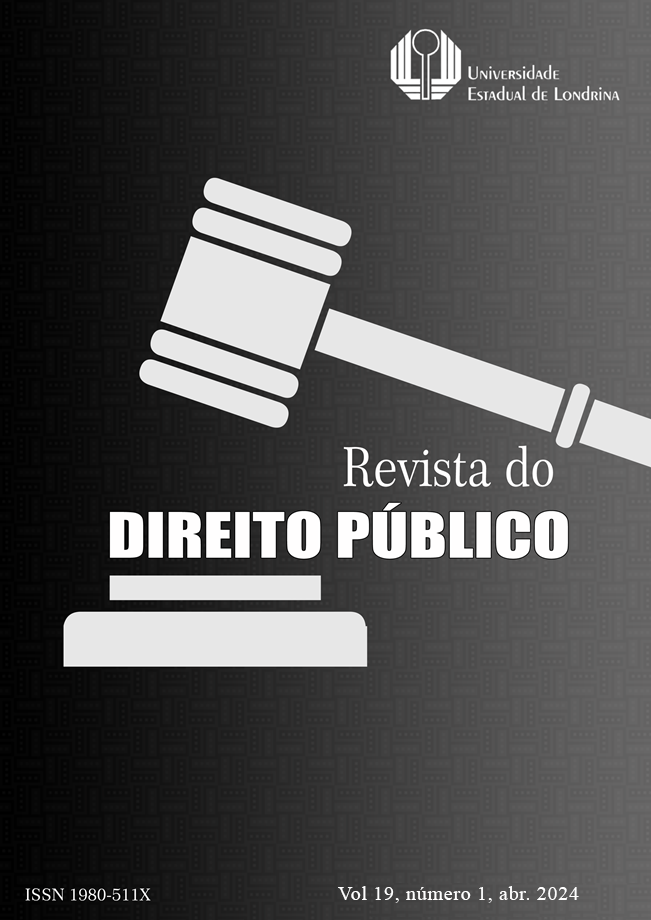POST-MORTEM ASSISTED HUMAN REPRODUCTION AND BRAZILIAN COURTS:
ANALYSIS OF SPECIAL APPEAL 1.918.421/SP
DOI:
https://doi.org/10.5433/1980-511X.2024.v19.n1.47163Keywords:
Biotechnology, Family law, Manifestation of Will, Post Mortem Assisted Human ReproductionAbstract
Assisted human reproduction (AHR) techniques are
being increasingly used, however, over time, conflicts arise and
demands are proposed before the Judiciary, which must provide
a response. In view of this, the present work aims to analyze the
judgments of the Brazilian courts on the subject of post mortem
RHA, mainly the Special Appeal n. 1.918.421/SP of the Superior
Court of Justice (STJ), with the purpose of tracing what has been
the jurisprudential understanding on the subject and how the
legal system has been used. The work uses the deductive method,
performing the analysis of the main cases on the subject. Thus,
it is concluded that the Brazilian legal system has not adequately
regulated procedures involving RHA, in view of this, courts
have often used technical regulations from other bodies to base
their decision. With regard to post mortem RHA, the courts have
always observed the existence or not of the deceased's will,
in order to then authorize the procedure. With this research, it
is clear that the decision of the STJ is in accordance with the
decisions of other courts, however, it should be noted that the
expression of will does not necessarily need to be written,
and can be proved by other means. Finally, it is clear that it is
essential that the Terms of Free and Informed Consent properly
contemplate the destination of the embryos/genetic material in
different situations, since they can be used as a means of proof
of the manifestation of will.
Downloads
References
BIGARELLI, Barbara. Benefícios chegam ao congelamento de óvulos e à fertilização. Globo: Valor. Publicado em 14 nov 2019. Disponível em:< https://valor.globo.com/carreira/noticia/2019/11/14/beneficios-chegam-ao-congelamento-de-ovulos-e-a-fertilizacao.ghtml>. Acesso em: 10 fev 2021.
BRAGATO, Fernanda Frizzo; SCHIOCCHET, Taysa. Reprodução Humana Assistida: aspectos éticos e legais da fecundação artificial post mortem no direito brasileiro, In: BOECKEL, Fabricio Dani de; ROSA, Karin Regina Rick (Org.). Direito de Família em Perspectiva Interdisciplinar. Rio de Janeiro: Elsevier, 2011.
DIAS, Maria Berenice. Manual de Direito das Famílias. 10ª Ed rev, atual e ampl. São Paulo: Editora Revista dos Tribunais, 2015.
DINIZ, Maria Helena. O Estado Atual do Biodireito. 5ª ed. rev., aum. e atual. São Paulo: Saraiva, 2008.
LOBO, Fabíola Albuquerque. As transformações do direito de família brasileiro à luz da Constituição Federal de 1988. Civilistica.com. Rio de Janeiro, a. 8, n. 3, 2019. Disponível em: <http://civilistica.com/as-transformacoes-do-direito-de-familia/>. Data de acesso.
MALUF, Carlos Alberto Dabus; MALUF, Adriana Caldas do Rego Freitas Dabus. A família na pós-modernidade: aspectos civis e bioéticos. Revista da Faculdade de Direito da Universidade de São Paulo, v. 108, p. 221-241, jan/dez 2013. DOI: https://doi.org/10.11606/issn.2318-8235.v108i0p221-242
MASCARENHAS, Igor de Lucena; DADALTO, Luciana. Instabilidade normativa: nova resolução do CFM sobre reprodução humana assistida. Jota: Opinião e Análise. Publicado em: 01/07/2021. Disponível em: https://www.jota.info/opiniao-e-analise/artigos/instabilidade-normativa-nova-resolucao-do-cfm-sobre-reproducao-humana-assistida-01072021 . Acesso em: 9 jul 2021.
MEIRELES, Rose Melo Vencelau. Negócios Biojurídicos. PONA, Éverton Willian (coord.); AMARAL, Ana Cláudia Corrêa Zuin Mattos do (coord.); MARTINS, Priscila Machado (coord.). Negócio jurídico e liberdades individuais - autonomia privada e situações jurídicas existenciais. Curitiba: Juruá, 2016.
RODRIGUES, Edwirges Elaine. Famílias ectogenéticas: a necessidade de normatização da reprodução assistida e regulamentação das suas consequências jurídicas. Civilistica.com. Rio de Janeiro, a. 9, n. 2, 2020. Disponível em: <http://civilistica.com/familias-ectogeneticas/>. Data de acesso.
SÁ, Maria de Fátima Freire de; NAVES, Bruno Torquato de Oliveira. Bioética e Biodireito. 5ª Ed., rev., atual. e ampl. Indaiatuba,SP: Editora Foco, 2021. E-pub.
SÁ, Maria de Fátima Freire de; SOUZA, Iara Antunes de. Reprodução Humana Assistida Post Mortem: Planejamento Familiar, Reconstrução da Vontade e Responsabilidade Civil à Luz do Caso da Escocesa Ellie. In: TEIXEIRA, Ana Carolina Brochado; ROSENVALD, Nelson; MULLEDO, Renata Vilela (Coords). Responsabilidade Civil e Direito de Família: O Direito de Danos na Parentalidade e Conjugalidade. Indaiatuba: Editora Foco, 2021. E-pub.
STJ. Implantação de embriões congelados em viúva exige autorização expressa do falecido, decide Quarta Turma. Notícias STJ. Publicado em 15/06/2021. Disponível em: https://www.stj.jus.br/sites/portalp/Paginas/Comunicacao/Noticias/15062021-Implantacao-de-embrioes-congelados-em-viuva-exige-autorizacao-expressa-do-falecido--decide-Quarta-Turma.aspx . Acesso em: 09 jul 2021.
TEPEDINO, Gustavo. Novas famílias entre autonomia existencial e tutela de vulnerabilidade. Revista Brasileira de Direito Civil - Editorial, vol. 6, out/dez 2015.
YOUNG, Beatriz Capanema. Os contratos nas técnicas de Reprodução Assistida. In: BARBOZA, Heloisa Helena; LEAL, Livia Teixeira; ALMEIDA, Vitor. Biodireito: Tutela Jurídica das Dimensões da Vida. Indaiatuba, SP: Editora Foco, 2021, p. 16.
Downloads
Published
How to Cite
Issue
Section
License
Copyright (c) 2024 Juliana Carvalho Pavão, Rita de Cássia Resquetti Tarifa Espolador

This work is licensed under a Creative Commons Attribution-NonCommercial-NoDerivatives 4.0 International License.
Os autores cedem à Revista do Direito Público, direitos exclusivos de primeira publicação, com o trabalho simultaneamente licenciado sob a Licença Atribuição-NãoComercial-CompartilhaIgual 4.0 Internacional. Esta licença permite que terceiros façam download e compartilhem os trabalhos em qualquer meio ou formato, desde que atribuam o devido crédito de autoria, mas sem que possam alterá-los de nenhuma forma ou utilizá-los para fins comerciais. Se você remixar, transformar ou desenvolver o material, não poderá distribuir o material modificado.












